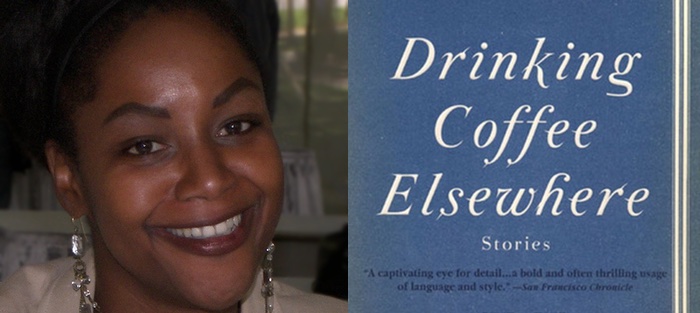ZZ Packer was just twenty-six when she published “Brownies” in Harper’s, part of a remarkable string of early successes that preceded her highly praised collection Drinking Coffee Elsewhere (Riverhead, 2003), still her only book in print. Seen from this distance, “Brownies” is a youthful effort, in parts awkward and straining, elsewhere surprising, assured, and moving. Caught at this gawky early moment, Packer shows herself to be what she has to this point remained: a writer of great and imperfectly fulfilled promise.
“Brownies” benefits from a brilliant and intrinsically interesting conceit. Sometime around 1983, at Camp Crescendo— somewhere, we gather, in the vicinity of Atlanta—an all-black troop of Brownies encounters the all-white Troop 909. Certain members of the black scout group claim one of the white scouts has called them “nigger,” though it’s clear to the reader that this claim is dubious at best. The story tracks the Brownies’ halting, finally unsuccessful plans to take their revenge upon the white scouts. How moving and convincing this is—that a group of African-American fourth graders would decide to contest the great powers by picking a fight against an unlikely and innocent enemy. The heartbreaking twist: the white scouts are mentally disabled, and the girl identified as the name-caller is discovered to be mute. No slur was ever spoken. Worse, the presence of another disfavored group makes clear the reality of the Brownies’ own inferior position within the larger culture. “Why did we have to be stuck at a camp with retarded girls? You know?” one girl asks. The answer: “You know why.” Instead of providing an opportunity for revenge, the presence of Troop 909 offers a lesson in humiliation and subjection.
But “Brownies” is not really—or not only—about race, equality, and fairness. It is a about becoming a writer. Like many important stories, it is itself about telling stories.
 I’m always a little balked by the early pages of “Brownies.” A great deal of time is spent in backstory—long, muddled passages in which we are introduced to one character after another. I find I have to stop and reread to make sure I’m not missing something crucial, and even then I have trouble tracking the people. Arnetta and Octavia, later the instigators of much of the action, are indistinguishable. Drema and Elise are shown “doubled up on each other like inextricably entwined kites,” a description that in no way helps me see these girls. It doesn’t matter—they’re only there to fill space anyway. Mrs. Margolin is vivid enough, huffing and puffing and leading with her bosom, but how does she differ from Mrs. Hedy, exactly? One is religious, the other has had an operation? Or does the religious one also have the operation? Mrs. Hedy is Octavia’s mother, a fact that never seems to matter. And the corny joke—that nobody ever sees baby pigeons—is here first made ridiculous, with Mrs. Margolin given a belt “made entirely from the feathers of baby pigeons” (an obvious impossibility), then overstuffed with portent: “Whites were like those baby pigeons: real and existing, but rarely thought about.”
I’m always a little balked by the early pages of “Brownies.” A great deal of time is spent in backstory—long, muddled passages in which we are introduced to one character after another. I find I have to stop and reread to make sure I’m not missing something crucial, and even then I have trouble tracking the people. Arnetta and Octavia, later the instigators of much of the action, are indistinguishable. Drema and Elise are shown “doubled up on each other like inextricably entwined kites,” a description that in no way helps me see these girls. It doesn’t matter—they’re only there to fill space anyway. Mrs. Margolin is vivid enough, huffing and puffing and leading with her bosom, but how does she differ from Mrs. Hedy, exactly? One is religious, the other has had an operation? Or does the religious one also have the operation? Mrs. Hedy is Octavia’s mother, a fact that never seems to matter. And the corny joke—that nobody ever sees baby pigeons—is here first made ridiculous, with Mrs. Margolin given a belt “made entirely from the feathers of baby pigeons” (an obvious impossibility), then overstuffed with portent: “Whites were like those baby pigeons: real and existing, but rarely thought about.”
It is the group portrait that Packer is struggling with. As “Brownies” is a portrait of groups in conflict, this difficulty slows and stalls the story. Packer is also wrestling with a peculiar, difficult point of view—Snot, or Laurel, our first-person protagonist, is largely buried in these early pages. This will make perfect sense later, but here, early, as Packer uses Laurel to convey a great deal of information without using that information to also render Laurel as a character, the effect is baffling. We get a great flood of data, but there’s nobody at home within the point of view to help direct the flow.
The exception to this is Packer’s portrait of Daphne —or really Packer’s rendering of Laurel’s observation of Daphne. This is a portrait of an individual, as seen by an individual, and the description is simple, sharp, and moving:
Daphne hardly ever spoke, but when she did her voice was petite and tinkly, the voice one might expect from a shiny new earring. She’d written a poem once, for Langston Hughes Day, a poem brimming with all the teacher-winning ingredients…. [To the prize ceremony Daphne had] worn clean, though faded, jumpers and dresses, but when she went up to the dais to receive her prize journal, pages trimmed in gold, she wore a new dress with a velveteen bodice and a taffeta skirt as wide as an umbrella.
Daphne has the advantage of being seen in isolation, of course, and in action. Unlike other troop members, she is also given the advantage of containing within herself a set of contrasting states: silent but her voice also tinkling, dressed in faded but also in fancy clothes, quiet and withdrawn but also the person honored in front of an audience. These contrasts make her vivid to us, and complicated.
Daphne is also a writer, which matters to our protagonist. Daphne’s poem haunts Laurel. “Those last lines pricked me,” she tells us,
they were so eerie, and as my father and I ate cereal, I’d whisper over my Froot Loops, like a mantra, “You are my father, the veteran. You are my father, the veteran, the veteran, the veteran,” until my father…marched me up to my teacher one morning and said, “Can you tell me what the hell’s wrong with this kid?”
We surely hear the influence of “Bullet in the Brain,” Tobias Wolff’s masterpiece, which concludes with its own repeated mantra—they is, they is, they is. Like “Brownies,” that story’s central figure is also a writer. Wolff was Packer’s teacher (and mine) in Stanford’s Stegner program in the late 1990s, when Wolff’s story first made its own glorious, disruptive passage through all our skulls.
In the portrait of Daphne there is nothing strained, no dumb jokes or outsize metaphors. The language is quieter, befitting its subject, and signaling Daphne’s importance to the story. She is the key to its meaning.
There are great silences in “Brownies.” The unspoken slur. The silence of the disabled girl accused of speaking it. The silence on the bus after the Brownies leave Camp Crescendo, insulted and humbled. And, of course, the silence of our narrator. She is our protagonist, yet she barely speaks a word before the story’s conclusion. Her only words, in fact, are those that effectively move the plot along. It is she who points out that Troop 909 will be alone in the bathroom, which sets in motion the Brownies’ plan. Laurel is, in effect, the creator of the action. Considered another way, Laurel is the story’s writer.
Even as the glorious last pages approach, the story continues to stall, falter, and fail. The meandering scene at the creek between Janice, Arnetta, Octavia, Elise, and Laurel seems to exist only to allow Laurel the opportunity to mention the bathroom, which then makes possible the Brownies’ first visit to the bathroom, which gives Laurel the opportunity to observe the patient, saintly Daphne cleaning the mess they find there,
bending, the thin of her back hunched like a maid caught in stage limelight. Stray strands of her hair were lit nearly transparent… She abided, bent. Then she began again, picking up leaves, wads of paper, the cotton fluff innards from a torn stuffed toy. She did it so methodically, so exquisitely, so humbly, she must have been trained. I thought of those dresses she wore, faded and old, yet so pressed and clean; I then saw the poverty in them, I then could imagine her mother, cleaning the houses of others, returning home, weary.
It is an excellent passage, once we get to it, and a crucial one. Laurel is struck by something unfamiliar, experiences empathy for Daphne, and finds herself imagining an unfamiliar life. Laurel is on her way not only to maturity but to a certain kind of maturity—a writerly kind. This is the beginning of a writer’s awakening.
But I can’t help feeling, every time I read this story, that Packer has taken too long to arrive here. The recognition that Troop 909 will be alone should be made to happen in the bathroom, not at the creek. And the story then takes a long time—far too long—to arrive at its climactic scene. The girls return to the cabin and sing to Mrs. Hedy. She is mourning “an imminent divorce from her husband,” the first we have heard of this. It takes a full three songs to dispel Mrs. Hedy’s gloom. Next we learn of Mrs. Margolin’s mysterious operation and its lingering aftermath, the principle purpose of which appears to be to remove Mrs. Margolin from the cabin. Left alone with the ineffective Mrs. Hedy, the Brownies are at last—many pages later—ready to head out through the darkened woods and confront their enemies, the girls of Troop 909.
And it is here, finally, with all the players in position, that the story begins to soar. From this point to its conclusion, the story knows exactly what it is about, and it is about it continually.
The story arises from the supposed utterance of a forbidden word. So it is only fitting that when Arnetta confronts Troop 909, it is the sound of the response that strikes Laurel. “What I hadn’t expected,” she says,
was the voice in which the denial was said. The girl sounded as though her tongue were caught in her mouth. “That’s a BAD word!” the girl continued. “We don’t say BAD words.”
It is language, and the use of it, that informs the rest of this confrontation between the troops. Octavia orders Janice to shut up, then tells the disabled girl, “You don’t have to tell anyone that we were here.” The girl, catching the scent of some all-too-rare advantage, asks why she shouldn’t talk. “If you said anything,” Arnette replies, “then you’d be a tattletale.” But every silence in the story has been broken:
The girl looked sad for a moment, the perked up quickly. A flash of genius crossed her face. “I like tattletale.”
The adults return to the scene. Troop 909’s leader appears and offers new language to use: her girls are “not retarded. They are delayed learners… Many of them just have special needs.” She even offers a possible explanation: “Some of our girls are echolalic… That means they will say whatever they hear, like an echo.” Arnetta now accuses one of the girls, “a small girl, smaller than any of us.” But the chosen girl “‘doesn’t speak. She can, but she doesn’t.'”
The Brownies’ case has fallen apart. They are not innocent victims. They have made innocent victims of people even more helpless than they. The force of their own suffering has brought them here, and this is the great sadness of “Brownies”: that such small people should feel such suffering, and should make an attempt to inflict it in turn upon others, who are themselves sufferers.
Two days later, on the nearly silent bus ride home, Laurel sits beside Daphne. Daphne gives Laurel her journal “without a word of explanation.” One nascent writer recognizing another. The journal is empty. Laurel is almost—but not quite—ready to begin her own story.
I opened the journal she’d given me. I looked out the window, trying to decide what to write, searching for lines, but nothing could compare with the lines Daphne had written. “My father, the veteran,” my favorite line of all time. The line replayed itself in my head, and I gave up trying to write.
What opens the door to language for Laurel? First: the Brownies themselves acknowledge the painful truth. Until now, no one has spoken explicitly of their second-class status. The words have been too painful to utter. But now they are necessary. They are the truth that can no longer go unrecognized.
“You know,” Octavia whispered, “why did we have to be stuck at a camp with retarded girls? You know?”
“You know why,” Arnetta answered. She narrowed her eyes like a cat. “My mama and I were in the mall in Buckhead, and this white lady just kept looking at us. I mean, like we were foreign or something. Like we were from China.”
“What did the woman say?”
“Nothing,” Arnetta said. “She didn’t say nothing.”
And now Laurel speaks.
“There was this time,” I said, “when my father and I were in the mall and–”
“Oh, shut up, Snot,” Octavia said.
Daphne, her fellow writer and truthteller, steps in:
“Go on, Laurel,” Daphne said to me. It was the first time she’d spoken the whole trip, and she’d said my name… I studied the girls, waiting for Octavia to tell me to “shut up” again before I even had a chance to utter another word, but everyone was amazed that Daphne had spoken. I gathered my voice.
And so language, and storytelling, begins to offer a means of understanding. Laurel, now newly named for us, and for herself, describes the altruism and dogmatic goodness of the Mennonites she and her father encountered in the mall. Some people are good and kind, or at least act in a good and kindly way. And it is always the temptation, Laurel’s story informs us, to take advantage of a subjected group. No matter who you are, you will be tempted to be cruel. You are not made good just because someone is taking advantage of you. Instead, you make yourself good through the choices you make: to clean the bathroom, as Daphne does, or to paint a porch, as the Mennonites agree to do. You are empowered to enact your own goodness. This understanding arrives to us even as it arrives to Laurel:
“Why,” Arnetta asked archly, as though she didn’t believe a word, “would someone pick a porch? If they’ll do anything, why not make them paint the whole house? Why not ask for a hundred bucks?”
I thought about it, and I remembered the words my father had said to them about painting our porch, though I had never seemed to think about his words after he’d said them.
“He said,” I began, only then understanding the words as they uncoiled from my mouth, “it was the only time he’d have a white man on his knees doing something for a black man for free.”
I remembered the Mennonites bending like Daphne had bent cleaning the restroom. I remembered the dark blue of their bonnets, the black of their shoes. They painted the porch as though scrubbing a floor.
Cruelty is always an option. Laurel finds her voice in order to say this. The writer’s first tool—even more important than language—is empathy. Discovering empathy for the Mennonites, whom her father has subjected, and discovering it for her father, too—and for herself, as one of those poor Brownies thrown in with Troop 909—Laurel has become a storyteller.
I’ve heard ZZ read this story aloud—twice, some years apart—and both times she broke down a little at the last few paragraphs, her own voice shaking as she fought back tears. It is, maybe, a sort of creation story for herself: maybe she sees herself in Laurel and Daphne both. I don’t know whether this story is in any way autobiographical, but, when reading Laurel and Daphne to life, maybe she reads herself to life as well.
ZZ’s been silent, at least relatively so, for a long time now. Such silences aren’t uncommon following a highly praised debut. Junot Díaz and Jeffrey Eugenides each took almost a decade to emerge with a second book, for example. It’s a lonely time. The pressure to produce can be daunting. Expectations are immense. Writing a novel under such scrutiny is very hard—novel writing requires solitude and a sense of being hidden away with your own world drawn up around your shoulders like a blanket. And life interferes: family, travel, teaching. And novels fail at least as often as they succeed, and they die inventively and aggressively—half-born, sinking beneath a swamp of research, remaining thin and under-realized despite our best efforts to plump them full of life, a heart refusing to beat no matter how conscientiously we’ve stitched the veins and arteries together. As writers, we can only sympathize with such lengthy pauses—such long intakes of breath. We can only empathize, and look forward to the next thing ZZ has to say.







